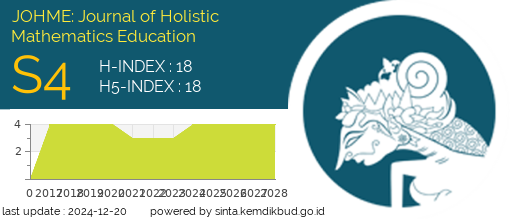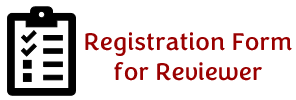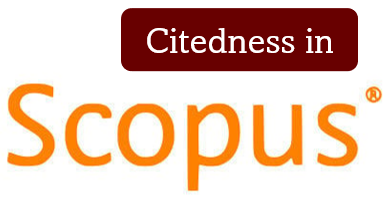THE IMPLEMENTATION OF STUDENT PORTFOLIOS TO IMPROVE GRADE 9 STUDENTS’ POSITIVE ATTITUDES TOWARD ASSESSMENTS AT AN INTERNATIONAL SCHOOL IN BOGOR
DOI:
https://doi.org/10.19166/johme.v4i1.1614Keywords:
positive attitudes, formative assessment, summative assessmentAbstract
As an integral part of learning, assessments play important roles in determining the effectiveness of students’ learning. However, in a grade 9 extended mathematics class at an International located in Bogor, it was found that the students showed negative behaviors during the test and learning processes as a manifestation of their attitudes toward assessments. Therefore, the Classroom Action Research modelled by Robert Pelton was conducted to improve students’ positive attitudes toward both formative assessment and summative assessment. As a result, by implementing the student portfolios in sixteen meetings, the students’ positive attitudes toward assessments were developing. This improvement was influenced by the involvement of cognitive, affective, and behavioral responses while the students were developing the student portfolios in this CAR scope and sequence.
References
Amyot, C. C. G., McCracken, M. S., Woldt, J. L., & Brennan, R. (2012). Implementation of portfolio assessment of student competence in two dental school populations. Journal of Dental Education, 76(12), 1559-1571. https://doi.org/10.1002/j.0022-0337.2012.76.12.tb05419.x
Anditya, N. H., Panggabean, M., & Hidayat, D. (2018). The acts of academic dishonesty in a Christian school. JOHME: Journal of Holistic Mathematics Education, 2(1), 1-11. https://doi.org/10.19166/johme.v2i1.952
Birgin, O., & Baki, A. (2007). The use of portfolio to assess student's performance. Journal of Turkish Science Education, 4(2), 75-90. Retrieved from https://files.eric.ed.gov/fulltext/ED504219.pdf
Box, C. (2019). Formative assessment in United States classrooms: Changing the landscape of teaching and learning. Cham, Switzerland: Springer International Publishing.
Crano, W. D., & Prislin, R. (2008). Attitudes and attitude change. New York, NY: Psychology Press.
Dafnoudi, C., & Kofou, I. (2016). The Europian language portfolio (ELP) as a teaching, learning and assessment tool of writing skills in senior high school. Retrieved from https://library.iated.org/view/KOFOU2016IMP
Eagly, A. H., & Chaiken, S. (1993). The psychology of attitudes. Fort Worth, TX: Harcourt Brace Jovanovich College Publishers.
Educational Resources Information Center. (1999). Assessment, articulation, and accountability, 1999: A foreign language project. Raleigh, NC: Public Schools of North Carolina, Dept. of Public Instruction.
Erwin, P. (2001). Attitudes and persuasion. Hove, UK: Psychology Press.
Fautley, M., & Savage, J. (2010). Assessment for learning and teaching in secondary schools. Exeter, UK: Learning Matters Ltd.
Hayden, M., & Stout, W. (2011). Taking the MYP forward. Woodbridge, UK: John Catt Educational Ltd.
Issler, K. D. (2009). Inner core belief formation, spiritual practices, and the willing-doing gap. Journal of Spiritual Formation and Soul Care, 2(2), 179-198. https://doi.org/10.1177/193979090900200203
Joshi, M. K., Gupta, P., & Singh, T. (2015). Portfolio-based learning and assessment. Indian Pediatrics, 52(3), 231-235. https://doi.org/10.1007/s13312-015-0613-2
Kniep, G. O. M. (2000). Becoming a better teacher: Eight innovations that work. Upper Saddle River, NJ: Pearson/Merrill Prentice Hall.
Lam, R. (2018). Portfolio assessment for the teaching and learning of writing. Singapore: Springer Nature.
Pelton, R. P. (2010). Action research for teacher candidates: Using classroom data to enhance instruction. Lanham, MD: Rowman & Littlefield Education.
Tarigan, M. S. (2019). Implikasi penebusan Kristus dalam pendidikan Kristen [The implication of Christ’s redemption on Christian education]. Polyglot: Jurnal Ilmiah, 15(2), 203-222. https://doi.org/10.19166/pji.v15i2.1409
Van Brummelen, H. (2009). Walking with God in the classroom: Christian approaches to learning and teaching. Colorado Springs, CO: Purposeful Design Publications.Downloads
Published
How to Cite
Issue
Section
License
Authors who publish with this journal agree to the following terms:
1) Authors retain copyright and grant the journal right of first publication with the work simultaneously licensed under a Creative Commons Attribution License (CC-BY-SA 4.0) that allows others to share the work with an acknowledgement of the work's authorship and initial publication in this journal.
2) Authors are able to enter into separate, additional contractual arrangements for the non-exclusive distribution of the journal's published version of the work (e.g., post it to an institutional repository or publish it in a book), with an acknowledgement of its initial publication in this journal.
3) Authors are permitted and encouraged to post their work online (e.g., in institutional repositories or on their website). The final published PDF should be used and bibliographic details that credit the publication in this journal should be included.”










